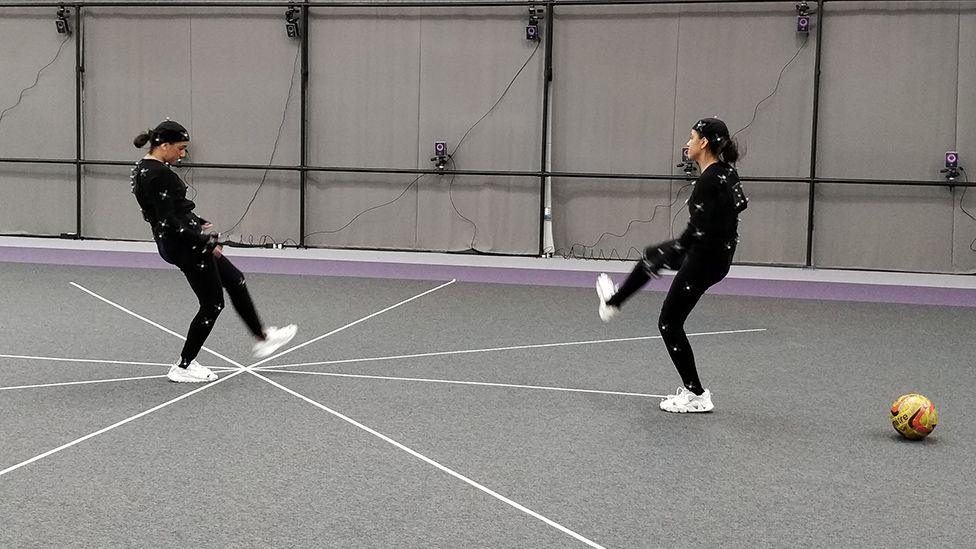Will Football Manager help women's football grow?

Football Manager 26 features female players and teams for the first time, and also a female manager in its artwork
- Published
Women's football has already taken some huge steps in recent years, but will a computer game help it grow even more?
This week's launch of FM26, the latest edition of the popular Football Manager series, will enhance visibility of the women's game and may also help unearth some unheralded female talents too.
The previous edition of FM - which sees you step into the shoes of a manager, pick a team, and try to lead them to victory - was released in 2024 and has been played by 19 million people.
The series' origins go back more than 30 years to 1992's Championship Manager but, for the first time, FM26 allows fans to manage women's teams as well as men's.
It features a database of more than 36,000 female players and another 5,000 staff, with 14 playable leagues across 11 nations and three continents.
The company behind it, Sports Interactive, already share their extensive data on more than 700,000 male players with real-life clubs who have used it as a scouting tool for more than a decade.
Now they can do the same with the stats on female players that they began collating in 2021.
'An army of people from the women's game helped us represent it properly'

The game allows players to control many aspects of running a football club - but, like real managers, the matches themselves must be watched from the sidelines
"There were a lot of challenges around adding the women's game to FM," said Miles Jacobson, studio director of Sports Interactive.
"We've had our scouting set-up for 30-plus years in men's football but we had to start from scratch on the women's side, and we wanted to ensure that there were women's football experts involved.
"In the end, an army of people from the women's game helped us, who wanted us to ensure that women's football was properly represented.
"It was hard to find certain bits of information because although data is prevalent in men's football, it is not the same in the women's game, where it is often inaccurate or missing altogether.
"Putting it all together was certainly a challenge, but it was one that we took on and hope what we've produced is not just of use in the game but is actually of use in women's football as well.
"We have 40 clubs who we work with on the data side, that we have a direct relationship with, and hopefully they are going to benefit from our database because the majority of those clubs have women's teams as well as men's as part of their group."
'We're about to engage a whole new audience'

As well as building a new stats database, Football Manager's makers also had to record motion capture for female players, using former pros Rosie and Mollie Kmita to suit up and execute the moves
The game prides itself on its depth, realism and authenticity and new motion-capture sequences were recorded for FM26 to represent female players in the 3D match simulations.
Everyone on the database has a set of individual attributes marked out of 20, ranging from physical statistics such as pace, agility and acceleration to skills like passing ability and dribbling. It also reflects characteristics like bravery and composure.
"We had a big debate that went on for many months about how to deal with the differences between male and female players in the stats," Jacobson added.
"The fastest woman in the world, as we know from world records, is slightly slower than the fastest man, but we thought it was unfair that the fastest woman in the game wouldn't have a 20 rating for pace or acceleration.
"So we kept it separate. We compare women with women and men with men when it comes to playing attributes. When it comes to staff attributes, there isn't a difference."
Former professional players, twin sisters Mollie and Rosie Kmita, were both involved in the motion capture process for the game, and Mollie feels being able to manage a women's team will engage new gamers and educate existing ones.
"Growing up, I would never have imagined playing Football Manager because it wasn't a space for us," she said.
"Normalising women's football in the game is exciting and we'll see the repercussions of that.
"For someone who's never been interested in women's football before and decides to manage a women's team, the amount of information and knowledge they will learn about players, teams and leagues is exciting.
"I think we're about to engage a whole new audience and I'm excited to see how this community continues to grow."

Ben Haines, Ellen White and Jen Beattie are back for another season of the Women's Football Weekly podcast. New episodes drop every Tuesday on BBC Sounds, plus find interviews and extra content from the Women's Super League and beyond on the Women's Football Weekly feed